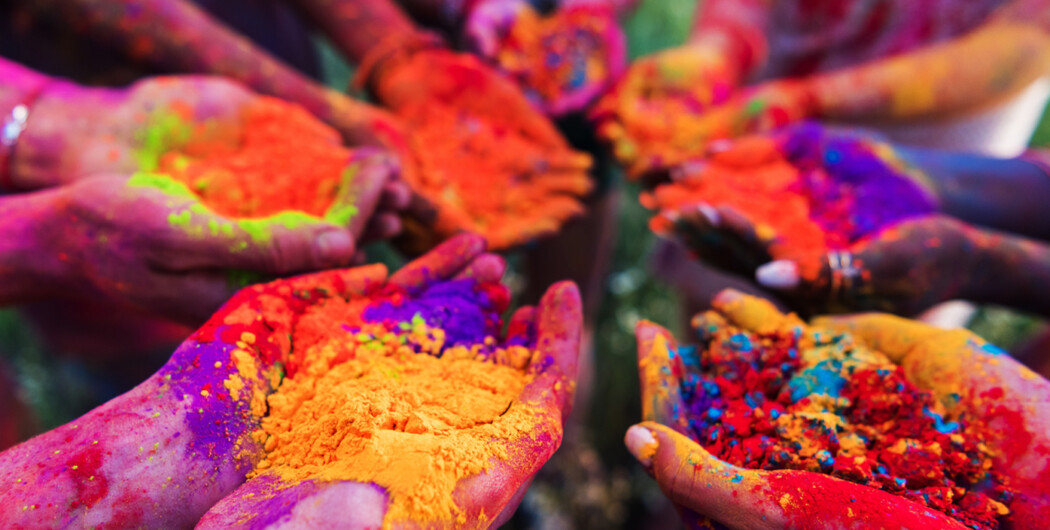

Holi, the vibrant festival of colours, is an annual celebration of life, love, and the triumph of good over evil. This joyful holiday is celebrated by millions of people worldwide, particularly in India, Nepal, and other South Asian countries. Holi 2023 is March 8th, a time for people to come together and spread joy, love, and happiness.
If you use Snapchat, we have prepared an amazing interactive mask for you — record your videos, collect candles and Happy Holi!
Point your smartphone’s camera at the QR code below and go to Snapchat.

Introduction to Holi festival
Holi holiday is one of the oldest and most significant Hindu festivals, with roots that go back thousands of years. The festival has been celebrated for generations and symbolises unity, friendship, and the triumph of good over evil. It is a time to forget past grievances, forget differences, and come together to celebrate life, happiness, and the arrival of spring. Holi is also an opportunity to forgive and forget, to start anew, and to spread happiness and joy to everyone.
The legend behind Holi festival
One of the most well-known legends behind the celebration of Holi is the story of the demon king, Hiranyakashyap, and his son, Prahlad. Hiranyakashyap was a powerful demon king who believed he was the supreme being and demanded that everyone worship him. However, his son, Prahlad, was a devoted follower of Lord Vishnu and refused to worship his father. Angered by his son’s refusal, Hiranyakashyap attempted to kill Prahlad on several occasions, but each time Lord Vishnu saved him.
Finally, Hiranyakashyap decided to ask his sister, Holika, to help him. Holika had a special power that made her immune to fire, and she thought she could kill Prahlad by sitting with him in a blazing fire. However, the plan backfired, and instead, Holika was burned to death while Prahlad remained unscathed, protected by his devotion to Lord Vishnu. This event is celebrated as Holi, the triumph of good over evil, and it symbolises the victory of righteousness over evil.
Rituals and traditions of the Holi festival
Holi is a two-day festival, and each day is filled with a variety of rituals and traditions. The first day, known as Chhoti Holi or Holika Dahan, is a time to light bonfires and offer prayers and offerings to the gods. This day symbolises the burning of Holika and the triumph of good over evil. The second day, known as Rangwali Holi or Dhuleti, is the festival’s main day, filled with colour, music, dance, and feasting.
One of the most popular Holi activities is the throwing of coloured powders, called “gulal,” into the air and smearing them on each other. People sing and dance to traditional Holi songs, play with water, and feast on delicious sweets and savouries. Holi is a time to let loose, forget about responsibilities, and have fun with friends and family.

The significance of the Holi festival
Holi is a time for people to come together and celebrate the arrival of spring and the end of winter. It is a time to forget past grievances and differences and start anew. Holi is also an opportunity to forgive and forget, to start anew, and to spread happiness and joy to everyone.
Holi symbolises unity and friendship as people from all walks of life come together to celebrate this joyous holiday. It is a time to break down barriers and create bonds between people from different backgrounds, cultures, and religions. Holi celebrates the human spirit and the power of love, compassion, and forgiveness.
Holi activities also include times for spiritual reflection and renewal. It is a reminder of the importance of following the path of righteousness, of always standing up for what is right, and of never succumbing to evil. Holi is a celebration of the victory of good over evil and the power of devotion and faith.
Top places to celebrate Holi 2023
Some of the top destinations for celebrating Holi in India include:
- Mathura and Vrindavan: These two cities in Uttar Pradesh are considered the birthplace of Lord Krishna and are famous for their elaborate Holi celebrations.
- Barsana and Nandgaon: These two villages in Uttar Pradesh are known for their unique Holi celebrations, including the tradition of “Lathmar Holi,” where women hit men with sticks as they sing and dance.
- Jaipur: The capital of Rajasthan is known for its elaborate Holi celebrations, traditional songs and dances, and the colourful throwing of coloured powders.
- Anandpur Sahib: This city in Punjab is known for its lively and enthusiastic Holi celebrations, including the tradition of “Hola Mohalla,” where martial arts and sports displays are held.
- Udaipur: This city in Rajasthan is known for its stunning palaces and lakes and its elaborate Holi celebrations, complete with singing, dancing, and the throwing of coloured powders.
Conclusion
Holi is a festival that holds deep cultural and spiritual significance for millions of people around the world. It is a time for people to come together and celebrate life, love, and the triumph of good over evil. Whether through the throwing of coloured powders, singing, and dancing, or simply spending time with loved ones, Holi is a time to spread joy and happiness to everyone.








